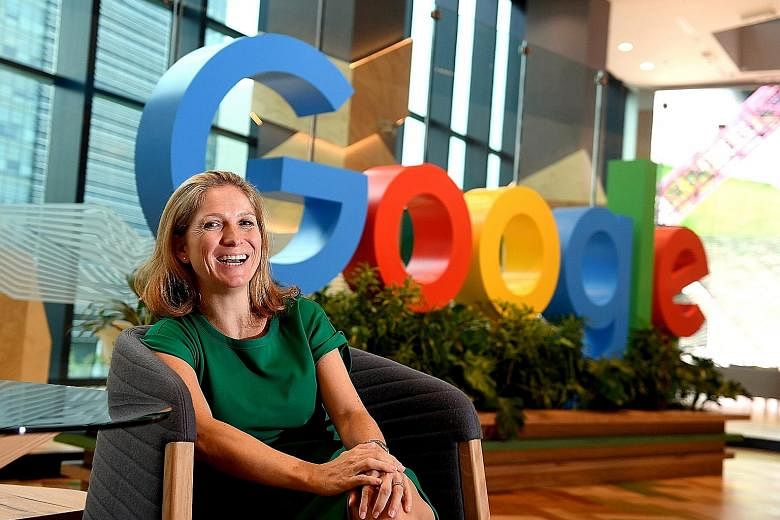The world's biggest Internet company wants to welcome more Singaporeans into its new "kampung".
Being Google, its facility that opened last Thursday is big on tech, of course, but the firm wants to add a homely local touch.
"Rather than calling these offices, we thought - let's call them kampungs," said Briton Joanna Flint, Google's Singapore country director.
"So we've got kampungs everywhere and we've created them like little villages."
Ms Flint, who is in her early 40s, told The Straits Times in an interview last week that the idea of the kampung came from wanting to build an office rooted in South-east Asian culture, conveying the idea of the kampung spirit and its sense of community.
"We want to bring the community into Google," she said, citing its newly launched "Code in the Community" programme which aims to conduct weekend classes for 3,000 children.
She added that the company will be hosting mentoring sessions at the new office, which occupies two entire blocks at Mapletree Business City II in Pasir Panjang.
It will also partner organisations to run events there.
The tech titan, which has been in Singapore for nine years, is ramping up its presence here.
In January, it announced on its website that it plans to set up a "large engineering presence in Singapore".
Ms Flint noted that Singapore is the company's fastest-growing office in Asia, with staff numbers doubling from 2013 to its headcount of 1,000 today.
She said that while the company has engineering sites across the globe, having a presence here "is a massive breakthrough".
One area of focus in engineering in Singapore is looking at the "next billion users", said Ms Flint.
This next wave of Internet users is expected to come from emerging markets like India and Indonesia, and they have different consumption habits, such as preferring to access the Internet mostly through their mobile phones.
The "next billion users" team will focus on building products for these mobile-first users in emerging markets.
Singapore has the advantage of being near several emerging economies, but the facility here can also build products for more advanced markets, she added.
While Ms Flint did not disclose the number of engineers Google will be hiring, she noted that the company is looking to invest heavily in talent.
That will likely please Singapore graduates, who often rank Google at the top of their most desirable employers.
But Ms Flint said that it is taking her "longer and longer to find the right talent".
"What I'm finding lacking is getting people who can problem-solve. Critical thinking, as well as being able to communicate, is the most important thing we're looking for."
She said that while roles used to be very specific in the past, she is now hiring around "foggy areas" and looking for people who might have to take on a different role from what they were doing six months ago.
"Hiring people who can only do one thing is going to be an issue. The company is moving, changing and evolving as the world is evolving, and that skill is becoming a critical piece."
For Ms Flint, a politics and philosophy major from the University of Manchester, dealing with "fogginess" and being open to new challenges have taken her to the top.
She started as a fresh graduate at British Airways in a global communications role, but ended up in the e-commerce division, responsible for taking the company's frequent flyer programme online. This was a pioneering and daring move at a time when physical mail for members was the norm.
"I had no technical background but I was fascinated with technology and could see what it was going to do," she recalled.
While prevailing sentiment about digitisation was simply to make statements available online, she pushed for the company to go further, allowing customers to do redemptions and check on statements on their own.
Her pioneering foray online got her recruited at age 27 by Singapore Airlines, which was looking for people with digital management.
Ms Flint jumped at the opportunity to fulfil her dream of living in Asia, where she first visited as a 17-year-old backpacker.
Her job at SIA was to make a then "irrelevant" website more relevant.
She spent three years there driving digital strategy, including encouraging the airline to release fares and marketing campaigns online, before moving to Ogilvy to advise big consumer brands on e-commerce and digital strategies.
When Ms Flint returned from maternity leave in 2008, she was approached to join Google, which had been in Singapore for only a year and was operating out of serviced offices.
While most new mothers might have hesitated to jump into a more uncertain environment, Ms Flint said she was "excited" by the incredible people she met during the interview.
"I wasn't sure I wanted the job because I wasn't sure what the job was. It was so vague, it was to lead MNC partnerships but it wasn't clear who or where they were."
The interview process, which she described as "teasing you and letting you reflect on who you are", and the conversations she had with seven of Google's head honchos reeled her in.
As country director for Singapore, a role she has had for almost three years, she is responsible for Google's sales and business development operations here, working with larger businesses as well as managing partnerships with the Government and media agencies.
Ms Flint's passion for Singapore comes through in her interview with The Straits Times.
She recounted how she serendipitously landed here on National Day 15 years ago, got "emotional" at last year's SG50 celebrations, and proudly professed to have spent 14 of the last 15 National Days in Singapore.
She summed up her leadership style with a nod to the little red dot.
"My leadership philosophy is to always think big. One of the things which I always challenge my team on, is that people always say Singapore is such a boring market, that it is so small. I say - it is only as small as your imagination."
With a laugh, she said, "I always give people Mr Lee Kuan Yew's book, Third World To First World, when they come to Singapore, because if you actually understand what this country has done... don't ever tell me that something's not possible."


